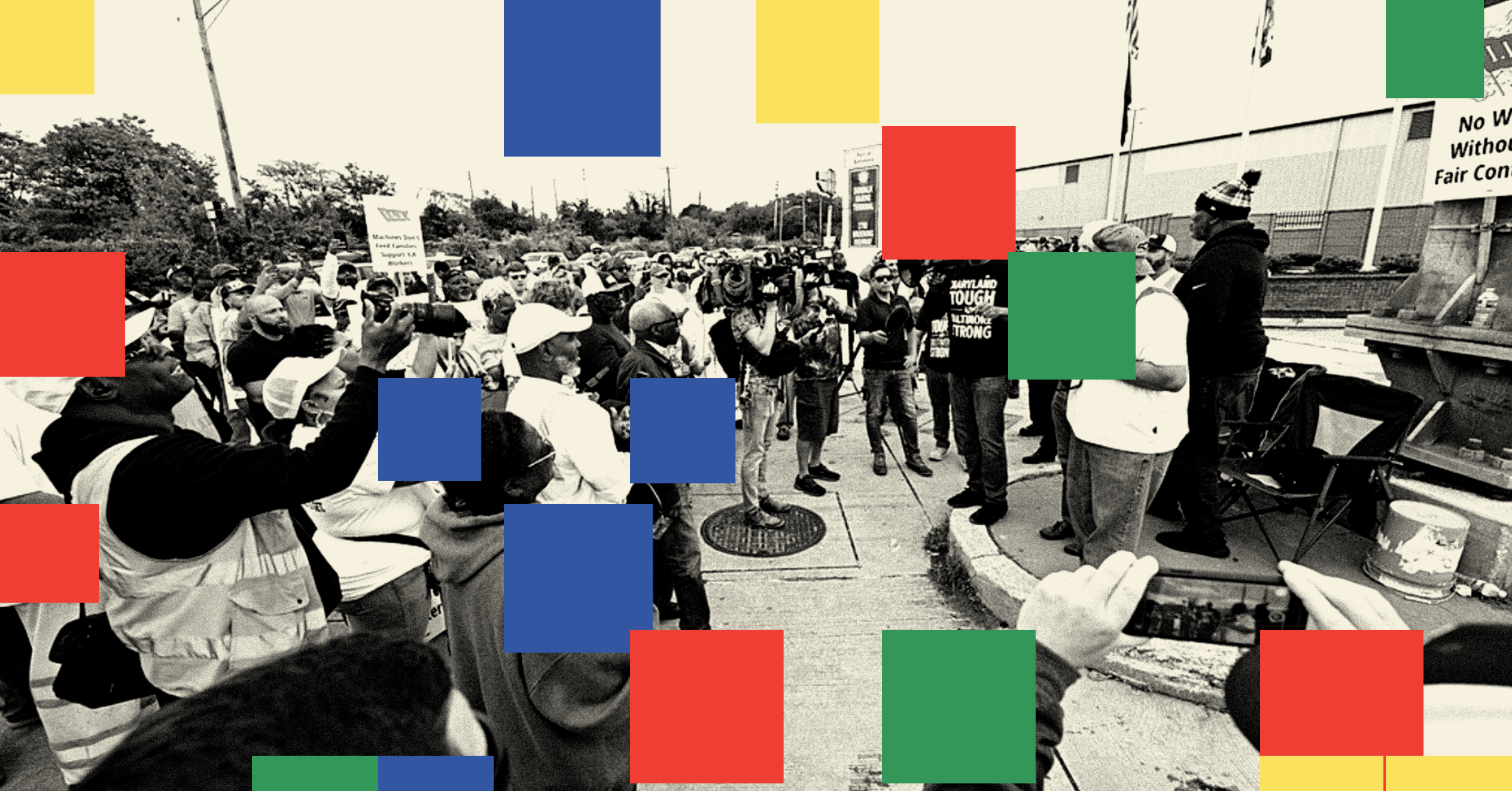With Israel hell-bent on ethnic cleansing and regional war and the Israel lobby joining Republicans to take a wrecking ball to both our electoral process and civil liberties, the fight to secure a democratic and secular state in Palestine has never been more closely tied to winning the same for ourselves in the United States.
As the Democrats flail in disarray and Republicans squabble over regime change, DSA can leverage our growing electoral and labor muscle to make meaningful interventions against the genocide. We can draw clear contrasts between our anti-war and humanitarian stance and the flagrant opportunism of both supposedly anti-intervention Republicans and supposedly pro-peace Democrats.
Palestine is a critical wedge in both electoral and labor organizing to split working class people and institutions from the Democratic Party and toward a democratic socialist alternative. Identifying a broad range of targets and coalition partners for arms embargo and BDS campaigns is most likely to consolidate and grow the pro-Palestine constituency in this country.
Labor for an Arms Embargo
Among the most promising national projects in this vein is the National Labor Commission’s Labor for an Arms Embargo (Resolution 42), a partnership with the Palestinian Youth Movement to pressure ports and other transit hubs to stop weapons shipments.
The campaign builds on the work, beginning in 2023, of rank-and-file activists across the country who channeled the power and dynamism of the pro-Palestine movement into their union halls to demand a ceasefire and an arms embargo. The NLC’s effort approaches the broadest possible swath of the labor movement in the struggle for an arms embargo by targeting unions’ political activity. It’s a strategy that fits neatly into DSA’s electoral work, by bringing pressure to bear on electoral targets through mass-based institutions we already influence. In cohering pro-Palestine activism in unions around electoral activity, Labor for an Arms Embargo also creates opportunities for confrontation with the Democratic Party by building a more militant and oppositional political arm of the labor movement.
Given the potential of this campaign to unite pro-Palestine unionists from all sectors and states around the demand to end weapons shipments to Israel, Amendment 42-A is shortsighted. The amendment would limit the scope of this project by confining it to logistics unions and their already tightly constrained legal capacity to leverage strike power.
Unlike France and Spain, where dockworkers enjoy strong constitutional protections for all labor-related activity, including political strikes, the United States has just the opposite. The infamous Taft-Hartley Act forbids sympathy and political strikes of the kind Marseille and Barcelona dockworkers have employed against shipments to Israel.
Decades of capitalist offensives have entrenched among labor leaders a bureaucratic, defensive approach to both contract organizing and political endorsements. But by engineering a nationwide effort to cohere progressive and pro-Palestine elements in unions around legislative arms embargo efforts, DSA union rank-and-filers are organizing not only for an end to weapons shipments but also to take unions’ political tools on the offensive.
BDS from City Hall to Capitol Hill
In Somerville, Massachusetts, “Somerville for Palestine” sprouted out of organizing for the country’s first ceasefire resolution. The group is now championing a ballot question for city-level divestment with the support of the City Council’s two DSA electeds. In Portland, Maine, a pro-Palestine coalition won divestment through a unanimous Council vote. As organizers in Somerville note, local momentum can grow into a national movement.
Resolution 36 appropriately outlines this strategy, identifying a variety of BDS targets and advocating construction of the “broadest coalitions possible” for Palestine solidarity. As long as a Republican trifecta runs D.C., local divestment efforts and arms embargo resolutions in mass institutions (especially unions) are best suited to lay the groundwork for a renewed national arms embargo campaign when Democrats return to a majority in Congress.
Through local BDS campaigns, DSA chapters can flex their electoral muscles canvassing for clear, agitational pro-Palestine demands while our labor activists can develop a new layer of pro-Palestine organizers in their unions. Rank-and-file momentum can renew interest in the political endorsement process and strengthen political action committees, orienting them toward broader working-class demands, while “rank-and-file for Palestine’”contingents to rallies, canvasses, and related events can connect labor to social movements.
A Civil Liberties Strategy
As critiques of Israel have become increasingly mainstream, pro-Israel lobbyists are gearing up to wage war on freedom of speech, and have recruited a wide range of allies, including ICE, Trump, and your local Democratic Party representatives, for the attack. To resist, DSA must join a united front of immigrant, religious, and union activists to defend our civil and labor rights.
In Massachusetts and across the country, the Israel lobby is demanding that government and educational institutions adopt the International Holocaust Remembrance Alliance (IHRA) definition of antisemitism. Under IHRA, education and mass media institutions from your local school committee to Facebook would be expected to suppress criticism of Israel under the guise of fighting antisemitism.
Unsurprisingly, the lobby’s effort to impose its manipulative definition of antisemitism also dovetails with attacks on organized labor and especially the rights of educators. In Massachusetts, the Democratic Party-controlled State House established a Special Commission on Combating Antisemitism taking aim at pro-Palestine protesters, organizations, and educators in the Massachusetts Teachers Association (MTA). These attacks are driving together labor leaders and pro-Palestine community organizers in defense of freedom of speech and cohering a Jewish, Muslim, and labor alliance in Massachusetts called Together for an Inclusive Massachusetts.
With the Right escalating attacks on civil, immigrant, and labor rights, and Democrats more interested in appeasing their corporate, pro-Israel donors and cudgeling their left flank, we must build a united front in defense of our civil liberties. Resolution 5 (Fight Fascism, Build Socialism) and Amendment 5-A02 helpfully outline the opportunities for a broad civil rights front to expose the limitations imposed by capitalism on democracy. By building a united front of immigrant, religious, and labor organizations, DSA can transform a tremendous threat to our civil rights into a powerful alliance to defeat the bipartisan pro-Israel corporate agenda.
Talking Palestine
Last month Israel brazenly attacked the Gaza Freedom Flotilla and arrested a dozen activists and journalists on international waters. In response, the largest left party in France, La France Insoumise (LFI), held massive rallies across the country demanding the freedom of the sailors, including one Rima Hassan, LFI Deputy to the European Parliament.
While we should hardly expect every elected to risk life and limb to challenge the Israeli military, DSA ought to expect from our candidates a commitment to the domestic struggle for a free Palestine. Accordingly, Resolution 1 (DSA for One Palestinian State) concisely outlines our position in principled, practical language grounded in both international law and socialist internationalism, and resolves that “explicit acceptance of these aims and messaging guidelines will be prerequisites for endorsement of political candidates.”
This is not a high bar — when electeds compromise our democratically decided program, it misleads the public about our vision and demoralizes our organizers and base. Our electeds should not want to rhetorically separate themselves from the work we do and the vision we hold.
Relatedly, it is up to us as members and convention delegates to determine the most accessible language we use in our platform and work. While dissecting language usually produces the least substantive yet most inflammatory kind of debate, the way we articulate our platform determines how it is understood by the public and must be considered appropriately.
Rhetorically, our work should center American complicity rather than casting judgments, positive or negative, on the substance or organization of Palestinian resistance. Debating the morality, rather than circumstances, of violent resistance is the Right’s territory.
We should affirm our support for a democratic and secular state in Palestine and vigorously oppose any attempt to soften this aim, either through equivocations about two states or accusations of “Western chauvinism” in our insistence on secularism. Our opposition to Israel and its settler-colonial mission includes opposition to ethno-religious supremacism and the persecution and elimination of religious and ethnic minorities; to fail to demand a secular alternative, as Amendment 01-A does, would be a disservice to our values.
Finally, our language should be direct, accessible, and factually correct. By contrast, Resolution 31 commits DSA to a range of overexplained verbiage for public and internal communications. While phrases like “IOF” and “Zionist Entity” might be situationally useful, we should not enshrine them as DSA’s official language because they could be unclear to those outside the stratum of highly informed converts, in addition to being factually incorrect (as much as I’d like Israel not to be a state, by any reasonable definition, it is).
As experienced community and labor organizers, we already know how to explain our position on Palestine in a clear and concise but uncompromising way; these changes would neither reinforce our platform nor make our opposition to genocide and apartheid more understandable.
The Expulsion Clause
The expulsion clause of Resolution 22 (For a Fighting Anti-Zionist DSA) aims to prevent Zionist ideology from influencing or representing DSA. But expulsions can’t contain ideas that arise as a consequence of historical circumstances outside our control. Instead, we should analyze the challenges the Israel lobby poses for our organization and map out our approach.
Zionism is not a live political current in DSA. We first endorsed BDS in 2017 and upheld it at every subsequent convention. Whatever residues of liberal or labor Zionism that held on were totally submerged by further membership growth and finally crashed out publicly after October 7th. That an expulsion clause is even necessary rests on the false premise a lurking Zionist tendency exists in the first place.
Even in cases where individuals or electeds are substantially out of step with the organization, expulsion is the wrong approach to confront ideological or strategic differences. Electeds who chart their own path away from our platform should simply not be endorsed, and the tendencies they reflect defeated on their own terms. Ideological expulsions are the blunt, organizationally corrosive instrument of self-indulgent sects and unworthy of a mass, multi-tendency organization.
Rather than chasing Zionist phantoms inside DSA, we should identify specific components of the organization — most prominently, electeds — vulnerable to outside Zionist pressure and formulate a strategy to prevent their capitulation to the Israel lobby. DSA can organize internally and externally to manage the contradictions of elected office.
Internally, we should run political education and campaigns that develop new leaders and cadre candidates ideologically committed to our program and strategy. Externally, we should organize constituencies and coalitions in the neighborhoods our electeds represent to prepare for inevitable capitalist and Zionist backlash. Cadre candidates committed to party-building and deeply tied to their communities are the most likely to vigorously defend our program and the least likely to capitulate to corporate-backed, astroturfed Zionist opposition.
Toward Clarity, Discipline, and Power
From our union halls to the halls of power, DSA is on the front lines of the struggle for a ceasefire, for an arms embargo, and for BDS.
We’ve stood with communities and organizations across the country advancing ceasefire resolutions.
We were part of a campaign, Uncommitted, that delivered some of the largest protest vote margins in recent memory.
We’re winning victories for divestment on our college campuses, in our towns and cities, and in our unions.
We’re part of an enormous and historic shift of public opinion against American support for Israeli apartheid and genocide.
This summer, we will recommit ourselves to this work by renewing our efforts for BDS and for an arms embargo and committing our electeds to unequivocal support for a free Palestine. We will lean into the momentum generated by the relentless passion of the pro-Palestine movement and forge new and ever-stronger coalitions of faith, labor, and community.
DSA has demonstrated it can speak and act with clarity and purpose; this convention, let’s continue to build a socialist movement that is unapologetically anti-imperialist, disciplined in its efforts, and rooted in solidarity with the Palestinian struggle for liberation.




